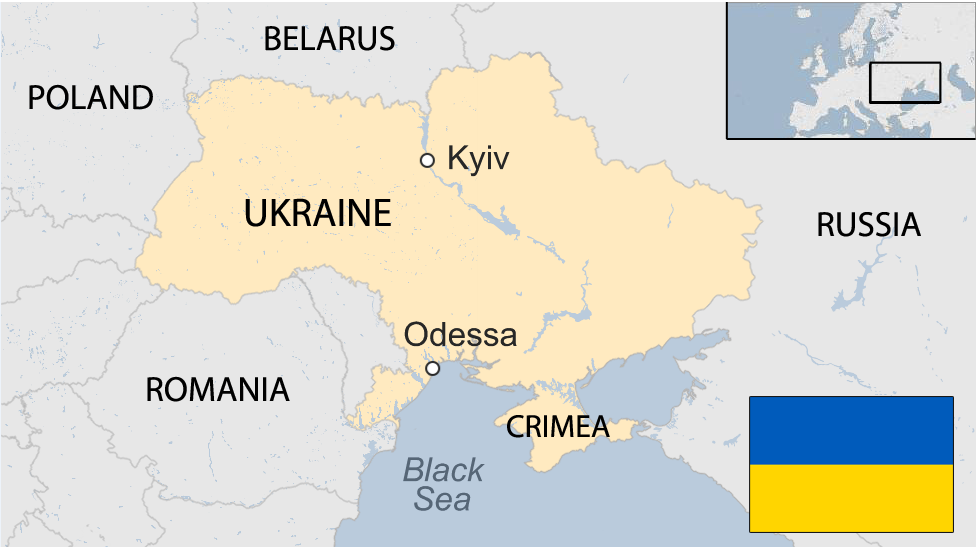Profile: Yulia Tymoshenko
- Published
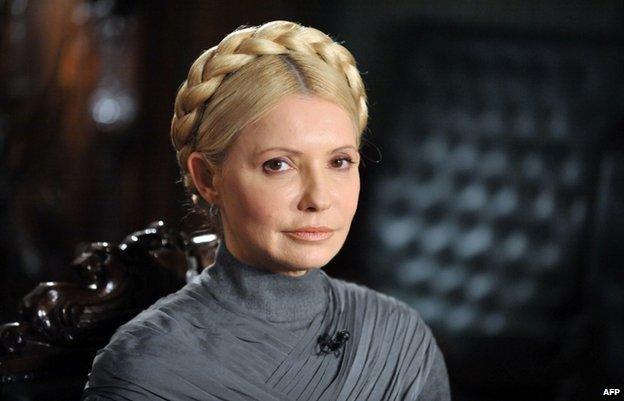
Tymoshenko's fiery rhetoric made her an icon of the 2004 Orange Revolution
A heroine of Ukraine's Orange Revolution, Yulia Tymoshenko is one of the country's most high-profile political figures and a key candidate in its presidential election.
Two days before the vote, she called for a national vote on joining Nato, what she termed a second referendum on Ukraine's independence.
She was freed in February after spending three years in jail for criminally exceeding her powers, charges that she says were politically motivated.
The glamorous, fiery orator helped lead Ukraine's revolt against a corrupt election in 2004, gaining international recognition.
But in 2011 she was convicted over a 2009 gas deal agreed with Russia and given a seven-year sentence.
She always argued the charges of abuse of power against her were a tissue of lies, inspired by the man she helped oust in 2004, Viktor Yanukovych - who returned to defeat her in the 2010 presidential election.
Yulia Tymoshenko told the crowd that "heroes never die"
Tymoshenko was for years a talisman for Ukraine's opposition but when she addressed crowds in Kiev's Independence Square hours after her release, the response was not entirely enthusiastic.
Her lawyers had long complained that the authorities had wanted her to remain in jail for the rest of her life. She was also facing tax evasion charges dating back to her time as head of a private energy company in the 1990s.
Her release was one of the conditions facing Mr Yanukovych before he baulked at signing an EU-Ukraine trade and partnership agreement last November.
During her time in jail she urged the authorities to transfer her to a German hospital so that doctors there can treat her chronic back pain.
In April 2013 the European Court of Human Rights ruled that her pre-trial detention had been "arbitrary and unlawful", though the judges did not rule on the legality of her conviction.
They did not explicitly support her claim that her detention was politically motivated, nor did they accept her allegations of physical maltreatment and medical neglect in prison.
Initially she was sent to Lukyanivska prison, where she suffered back problems. Tymoshenko's daughter Eugenia said she feared for her mother's life.
In late 2011 she was moved to a jail in the eastern city of Kharkiv. But her health problems continued and German doctors said she needed specialised medical care.
In 2012 she complained that she had been punched by prison guards as she resisted attempts to move her to a local hospital for treatment. She staged a temporary hunger strike over her prison treatment. The authorities disputed her version of events.
By the time of her release, she was under prison guard at a hospital in Kharkiv.
Bitter rivalry
Yulia Tymoshenko became wealthy in the 1990s at the head of an energy company and swiftly moved into politics.
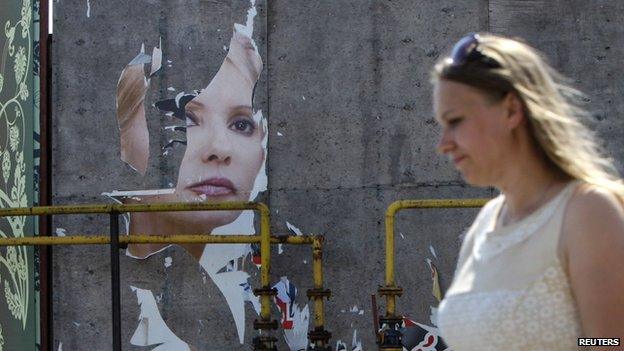
Tymoshenko has seen her popularity fade ahead of the presidential elections
She became prominent in 2004 during the Orange Revolution, when she and her ally Viktor Yushchenko packed the streets of Ukraine in protest at a rigged election that went in favour of the pro-Russian Mr Yanukovych.
The Supreme Court ruled in their favour, and the Orange alliance took power on a firmly pro-Western, anti-Russian platform.
No sooner had they taken over, with Tymoshenko as prime minister and Mr Yushchenko as president, than their relationship turned sour.
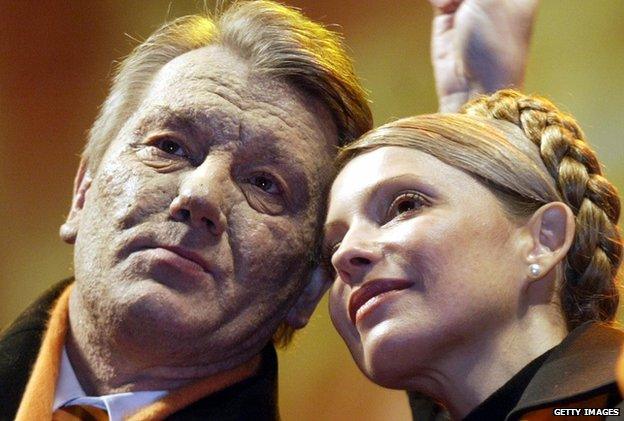
Yulia Tymoshenko led the 2004 protests alongside Viktor Yushchenko
He sacked her later that year as she feuded with his party colleagues.
She was reappointed in September 2007 as the parties resurrected their alliance, but the constant political squabbling between the president and the prime minister continued.
Political paralysis prevented any effective handling of the global economic crisis, which hit Ukraine hard.
Voters seemed to lay much of the blame at Mr Yushchenko's door, and by the time of the 2010 presidential election, the Orange Revolution was consigned to history. Mr Yushchenko won less than 6% of the vote in the first round, coming fifth.
Tymoshenko, meanwhile, remained a front-runner, going through to the second round against Viktor Yanukovych.
But much of her previous popularity had evaporated in the intervening five years, and she was beaten.
Despite her protests that Mr Yanukovych's victory was rigged - again - this time international monitors gave the vote a clean bill of health.
She was then ousted by MPs from the post of prime minister, despite her best attempts to cling on.
Forced to go into opposition, she promised to make life for President Yanukovych as difficult as possible, declaring: "We will protect Ukraine from this new calamity that has befallen her."
But many analysts argue that the calamity came earlier, as Tymoshenko and her two main rivals bickered while the country's economy went into freefall.
Successful tycoon
Her supporters have always seen Yulia Tymoshenko as a glamorous revolutionary challenging a corrupt, macho political elite.
Her stinging attacks on the oligarchs who prospered under the pre-Orange Revolution administration of Leonid Kuchma boosted her popularity among many Ukrainians frustrated by years of economic stagnation and corruption.
But critics point out that she made a fortune of her own.
She was born in 1960 in the industrial city of Dnipropetrovsk, in the mainly Russian-speaking east, which is now a stronghold of Mr Yanukovych.
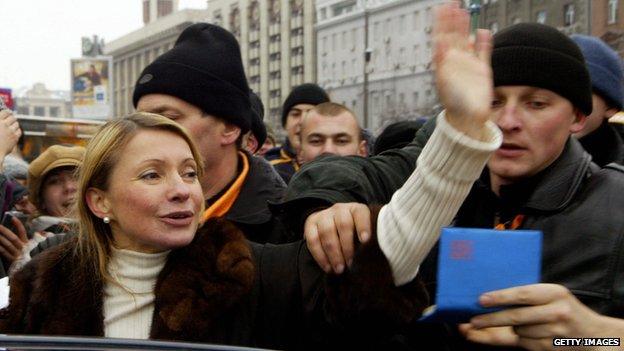
Tymoshenko was nicknamed "the gas princess" because of the wealth she acquired in the energy sector
She trained as an engineer and economist in the east and, when the Soviet Union broke up, sought to take advantage of the business opportunities that emerged.
In the mid-1990s she formed United Energy Systems of Ukraine, which helped supply gas to Ukraine's huge industrial base.
By some estimates, she became one of the richest people in Ukraine. She was nicknamed "the gas princess".
Like many tycoons in Ukraine, she sought to become involved in politics, and became part of Mr Yushchenko's government in 1999-2001, pushing through energy sector reforms.
But she fell out with then-President Leonid Kuchma, and after being held in prison for a month on corruption charges, she made it her goal to unseat him, launching a campaign that reached its climax in the Orange Revolution.
- Published27 January
